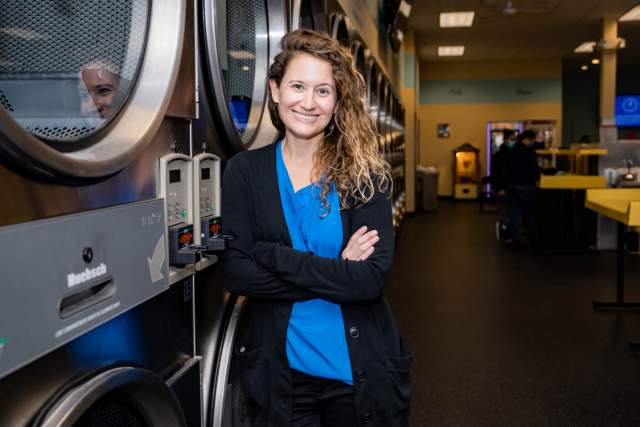Hart Posen is not shy about his privileged childhood, but only because it vanished with no warning. He grew up in Winnipeg, Canada, in a family of entrepreneurs. His father, who was raised in an orphanage, founded a rental car company in the early 1970s that became a large international firm. “By the time I was a young teenager, my family was very wealthy,” Posen says.
In the early 1980s, his parents bought him a Radio Shack TRS-80 Color Computer, replete with 8K of RAM, which he used to teach himself how to code. Just before he matriculated at the University of Manitoba, to study electrical and computer engineering, his father came to him with some bad news: they were bankrupt. Posen’s father had sold the rental car business, and in subsequent ventures he lost everything. It took him more than a decade to again experience entrepreneurial success.
Today, Posen is professor of strategy and entrepreneurship at Tuck, and the faculty director at the Center for Entrepreneurship. He joined Tuck in the summer of 2023. With a PhD from the Wharton School at the University of Pennsylvania, he has spent the last 11 years at the University of Wisconsin-Madison School of Business and, before that, seven years at the University of Michigan Ross School of Business. He has launched businesses in the technology and retail sectors, including a chain of dollar stores that had locations across Canada, which he cofounded with his brother and father. He has published dozens of articles in peer-reviewed journals and is a leading thinker in the role of learning in strategic management and the use of a mathematics-based computational methodology to study success and failure.
Ultimately, that created a deep desire to try to understand why someone like my father can start a business that becomes very big, yet over the subsequent sequence of businesses have failure after failure.
— Hart Posen, Professor of Strategy and Entrepreneurship
That might sound complicated, and it is, but for Posen it’s all related to that day his dad told him they were bankrupt. “Ultimately, that created a deep desire to try to understand why someone like my father can start a business that becomes very big, yet over the subsequent sequence of businesses have failure after failure,” he explains.
Posen’s way of answering that question is to think of the world as a series of learning problems. The simplest example of such a problem is when someone is struck by an idea for a new business, and it’s their job to figure out if it’s a good idea or a bad one. If it’s a good idea, they might want to quit their day job and invest time and money into the venture. If it’s a bad idea, the process stops. To make such a determination, the person must gather information, perhaps by interviewing potential customers, or making prototypes, or talking to other entrepreneurs. And after someone thinks they have a good idea, the learning process continues, as they decide how much to invest, or when to pivot in a new direction, or when to exit. “I can model that dynamic process, and it allows me to investigate things that are hard to investigate in other ways,” Posen says.
In his first paper studying entrepreneurship as a learning process, Posen cast a critical eye on the conventional wisdom that entrepreneurs were plagued by overconfidence. Researchers have argued (somewhat controversially) that, on average, returns on entrepreneurship are negative; that, in effect, entrepreneurs may be biased toward starting a business, even when expected returns from starting a firm relative to paid employment are negative. But framing entrepreneurship as a learning process allowed him to model the messy, conflicting information entrepreneurs must sift through before launching a startup. The model suggested that the ones who started businesses just happened to get the kind of information that encouraged them to enter, even though it might have been unreliable. “Their belief could be rational but wrong, because they got noisy information and learning from it is challenging,” Posen says.
In the same paper, Posen also studied the sunk-cost fallacy in entrepreneurship—the idea that entrepreneurs delay their exit to recoup their investment. Academics posited this sunk-cost fallacy was implicit in the correlation between an entrepreneur’s investment and the delay of their exit. Instead, Posen’s model suggested that the correlation would exist even without the fallacy—because of noisy information in the entrepreneurial journey. “It’s not the sunk-cost fallacy, but purely a result of that learning process,” he says.
That paper—“The Impact of Learning and Overconfidence on Entrepreneurial Entry and Exit,” published in 2018 in Organization Science—spawned two more papers looking at bias in the entrepreneurial learning process. The second one examined how different types of confidence biases should affect the way teams of entrepreneurs structure ownership and decision-making. And the third studied how the biases of entrepreneurs can inform the program of experimentation in lean startups. “These papers are important because they add nuance to the work from the 1990s saying entrepreneurs are biased and flawed,” Posen explains. “We don’t ask if we can change the entrepreneur, but how we can change the design of the team, or the program of experimentation, to best fit with the biases they have.”
You don’t just fall into good ideas.
Posen has applied the learning process frame to other areas as well, such as imitation as a strategy, and how uncertainty in learning curves affects outcomes. His research and his service as editor at two of the top management journals have put him in close contact with many of his new colleagues on the faculty, including Ron Adner, Pino Audia, and Giovanni Gavetti, all of whom he is collaborating with on new research. “I’m completely excited to be here, in this kind of intellectual environment that brings remarkable research, creativity, and rigor and values a high-quality educational process for our students,” he says.
In the spring, Posen is teaching a new course he is developing—called “Startup Strategizing” and will cover entrepreneurship strategies in new ventures. He also plans to write a book to go along with the course. At the Center for Entrepreneurship, Posen is interested in expanding the popular conception of entrepreneurs, beyond the stereotype of the 25-year-old founder in Silicon Valley. He wants students to know that a viable path to starting a business is through a job in the industry they’re interested in, so they can gain the knowledge and expertise it takes to identify a truly good idea.
“You don’t just fall into good ideas,” Posen says. “I see taking a job after grad school as part of the process of building the expertise that makes it possible to discover a potentially valuable entrepreneurial opportunity. So then it’s no longer, Should I take a job or start a company? It’s, Should I take a job to start a company?”
This story originally appeared in print in the winter 2024 issue of Tuck Today magazine.

